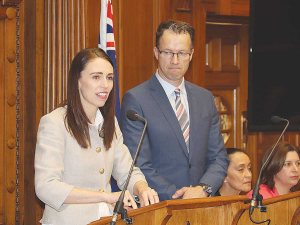Green no more?
OPINION: Your old mate has long dismissed the Greens as wooden bicycle enthusiasts with their heads in the clouds, but it looks like the ‘new Greens’ may actually be hard-nosed pragmatists when it comes to following voters.
 Prime Minister Jacinda Ardern and DairyNZ chief executive Tim Mackle at last week’s announcement in Wellington.
Prime Minister Jacinda Ardern and DairyNZ chief executive Tim Mackle at last week’s announcement in Wellington.
OPINION: In theory everyone is happy with the deal struck between the Government and the agricultural sector over emissions.
PM Jacinda Ardern and Climate Change Minister James Shaw waxed lyrical about how their agreement with the ag sector was a ‘world first’. A ‘win-win’, said Tim Mackle of DairyNZ. Another example of New Zealand showing “leadership based on sound science and practical solutions” claimed Beef + Lamb NZ chair Andrew Morrison.
But is everyone absolutely happy? The Government has inserted into the legislation a clause that says if the sector doesn’t do what it wants it will use this to drag the sector kicking and maybe screaming into the ETS. The Government is putting the acid on the ag sector.
The environmental group EDS says farmers need to perform and is quite sceptical of the arrangement. Greenpeace was typically cataclysmic and hysterical, labelling the Government as “sell-outs”.
Meanwhile, DairyNZ’s Tim Mackle doesn’t think the Government ‘backstop’ (an unfortunate choice of word) is necessary. What the backstop signals is that for all the rhetoric about a good deal, the Government fundamentally doesn’t trust the ag sector. If it did trust it why put it in?
The word ‘backstop’ is simply another word for ‘threat’. One senses that it is also the Government appealing to green voters and telling them ‘we will control farmers – don’t worry’. Yes, folks the election campaign has begun and the agri sector will likely be caught up in the scramble for votes.
All the flag waving and lovey-dovey rhetoric at Parliament the other day is nice, and hopefully it will work out. But this deal has the appearance of an arranged marriage, rather than one born out of unrequited love. Yes, farmers and horticulturalists have managed to get time to sort out their ag emissions. However the ‘backstop’ deadline built into the deal will unlikely do much to lift morale in the sector.
Ahead of it are water, land use and biodiversity issues that are still unresolved. Hopefully the farm sector groups – Beef + Lamb NZ, DairyNZ, Fed Farmers, Hort NZ and all – which have done a good job on agricultural emissions can make similar progress with the Government and bureaucrats on these thorny issues.
So despite all the spin, uncertainty and a lack of confidence remain in the agriculture sector.
Recent weather events in the Bay of Plenty, Gisborne/Tairawhiti, and Canterbury have been declared a medium-scale adverse event.
DairyNZ's chief executive Campbell Parker says the 2024/25 dairy season reinforces the importance of the dairy sector to New Zealand.
A New Zealand agribusiness helping to turn a long-standing animal welfare and waste issue into a high-value protein stream has won the Australian dairy sector's top innovator award.
OPINION: A bumper season all around.
Dairy Women's Network (DWN) has announced that Taranaki dairy farmer Nicola Bryant will join its Trust Board as an Associate Trustee.
Rural Women New Zealand (RWNZ) says it welcomes the release of a new report into pay equity.

OPINION: A mate of yours truly reckons rural Manawatu families are the latest to suffer under what he calls the…
OPINION: If old Winston Peters thinks building trade relations with new nations, such as India, isn't a necessary investment in…